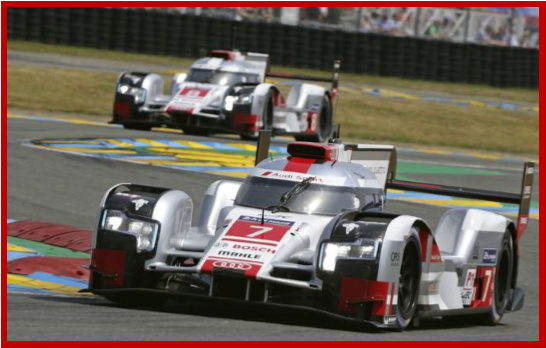Audi drivers will be running round four of the FIA World Endurance Championship (WEC) on August 30 as leaders of the standings after the summer break. Following two victories and another podium result, Marcel Fässler/André Lotterer/Benoît Tréluyer (CH/D/F) are traveling to Audi’s home at the Nürburgring with a 20-point advantage. Audi teammates Lucas di Grassi/Loïc Duval/Oliver Jarvis (BR/F/GB) will be racing together with 29 other teams on the Grand Prix circuit of the Nürburgring.
For class one Le Mans prototypes (LMP1) entered by manufacturers, the FIA World Endurance Championship (WEC) regulations stipulate hybrid systems and limit the amount of energy (fuel and electricity) available per lap. New technical rules based on the actual data from Le Mans 2015 will apply. They allocate slightly more fuel energy per lap to the Audi R18 e-tron quattro hybrid racecar (plus 0.4%). At the same time, the competition has to manage a reduction in gasoline consumption (minus 1.7 to 2.2%). The officials have reduced the fuel tank capacity of the racecars as well.
This year, Audi is battling for its third World Championship title in both the drivers’ and manufacturers’ classification of the FIA WEC.
The FIA World Endurance Championship – launched four years ago – will be competing in front of a German audience for the first time. The leaders of the manufacture’s standings are Toyota with 115 points in first, Audi second at 80 points, and Porsche in third at 60 points.
The race in Germany starts the decisive final stage of WEC. Within the twelve weeks, the last five races will be held in Europe, North America and Asia. The best drivers can score a maximum of 130 points in them until the end of November. Currently, the tally of the leaders, Fässler/Lotterer/Tréluyer, are at 80 points.
In the manufacturers’ championship, Audi is still in contention as well. As the runner-up in the standings, Audi is trailing the leader with a deficit of only 16 points, while 220 points are yet to be awarded.
The regulation changes for this weekend have an unknown effect.
“This will result in minor shifts,” says Chris Reinke, Head of LMP at Audi Sport. “The differences between the technological concepts in the field are now more precisely compensated for. This will have effects on the lap times of all the participants, but possibly also on how many laps we can complete between two pit stops.”
In addition to the new rating of the racecars, a special provision in the tire regulations will be applied at the Nürburgring as the track is new on the calendar. Eight tire sets will be available to the manufacturers for each car in qualifying and the race – compared to only six for most of the other six-hour races. The teams may also change tires during each refueling stop.


